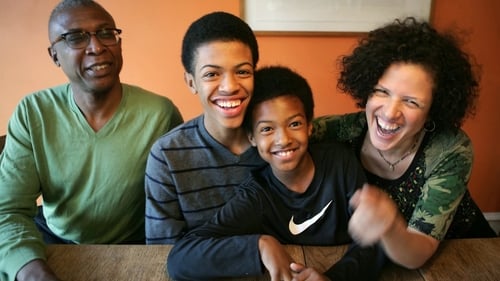
Director
An illuminating look at the influence that hand games played by Black girls has had on the American creative landscape.

Director
Intimate vérité, archival footage, and visually innovative treatments of poetry take us on a journey through the dreamscape of legendary queer poet Nikki Giovanni as she reflects on her life and legacy.

Director
Black women have played critical roles in all areas of the social justice movement but are often denied the platform they deserve. For Our Girls is a remix of the 2015 New York Times Op-Doc“ A CONVERSATION WITH BLACK WOMEN ON RACE.” It explores the stigmas Black girls face as they grow up within and outside their community. Working with the original interviews and reflections in 2020, mothers share their concerns with how they are shaping and impacting their daughters’ independence. The film is a love letter to Black daughter.

Translator
In 2013, the Dominican Republic stripped the citizenship of anyone with Haitian parents, rendering over 200,000 people without nationality, identity or homeland. Exploring this complex history and politics.

Storyboard Artist
In 2013, the Dominican Republic stripped the citizenship of anyone with Haitian parents, rendering over 200,000 people without nationality, identity or homeland. Exploring this complex history and politics.

Production Sound Mixer
In 2013, the Dominican Republic stripped the citizenship of anyone with Haitian parents, rendering over 200,000 people without nationality, identity or homeland. Exploring this complex history and politics.

Additional Camera
In 2013, the Dominican Republic stripped the citizenship of anyone with Haitian parents, rendering over 200,000 people without nationality, identity or homeland. Exploring this complex history and politics.

Producer
In 2013, the Dominican Republic stripped the citizenship of anyone with Haitian parents, rendering over 200,000 people without nationality, identity or homeland. Exploring this complex history and politics.

Writer
In 2013, the Dominican Republic stripped the citizenship of anyone with Haitian parents, rendering over 200,000 people without nationality, identity or homeland. Exploring this complex history and politics.

Director
In 2013, the Dominican Republic stripped the citizenship of anyone with Haitian parents, rendering over 200,000 people without nationality, identity or homeland. Exploring this complex history and politics.

Director
In 1937, tens of thousands of Haitians and Dominicans of Haitian descent were exterminated by the Dominican army, on the basis of anti-black racism. Fast-forward to 2013, the Dominican Republic's Supreme Court stripped the citizenship of anyone with Haitian parents, retroactive to 1929, rendering more than 200,000 people stateless. Elena, the young protagonist of the film, and her family stand to lose their legal residency in the Dominican Republic if they don't manage to get their documents in time. Negotiating a mountain of opaque bureaucratic processes and a racist, hostile society around, Elena becomes the face of the struggle to remain in a country built on the labor of her father and forefathers.

Director
The Changing Same is a magical realist, immersive, episodic virtual reality experience where the participant travels through time and space to witness the connected historical experiences of racial injustice in America.

Director
Eighty years after the lynching of Claude Neal, Florida's last spectacle killing, his ghost arises from the grave and we are all better off for it. In the Florida Panhandle lies the provincial town of Marianna, Florida, where one native resident runs a particular marathon in hopes of lifting the veil of racial terror caused by the town’s buried history.

Writer
Eighty years after the lynching of Claude Neal, Florida's last spectacle killing, his ghost arises from the grave and we are all better off for it. In the Florida Panhandle lies the provincial town of Marianna, Florida, where one native resident runs a particular marathon in hopes of lifting the veil of racial terror caused by the town’s buried history.

Producer
In 1999, filmmakers Joe Brewster and Michèle Stephenson turned the camera on themselves and began filming their five-year-old son, Idris, and his best friend, Seun, as they started kindergarten at the prestigious Dalton School just as the private institution was committing to diversify its student body. Their cameras continued to follow both families for another 12 years as the paths of the two boys diverged—one continued private school while the other pursued a very different route through the public education system.

Self
In 1999, filmmakers Joe Brewster and Michèle Stephenson turned the camera on themselves and began filming their five-year-old son, Idris, and his best friend, Seun, as they started kindergarten at the prestigious Dalton School just as the private institution was committing to diversify its student body. Their cameras continued to follow both families for another 12 years as the paths of the two boys diverged—one continued private school while the other pursued a very different route through the public education system.

Director
In 1999, filmmakers Joe Brewster and Michèle Stephenson turned the camera on themselves and began filming their five-year-old son, Idris, and his best friend, Seun, as they started kindergarten at the prestigious Dalton School just as the private institution was committing to diversify its student body. Their cameras continued to follow both families for another 12 years as the paths of the two boys diverged—one continued private school while the other pursued a very different route through the public education system.

Producer
Killing Zone is the story of an affluent Harlem psychiatrist living an unexamined life until his adoptive father- a doctor who plucked him from a Nigerian refugee camp as a child - is gunned down by an eleven-year-old in Brooklyn. In an instant, everything he's absorbed in twent years in America is thrown into question, and his search for the boy resurrects memories of his own buried past.

















